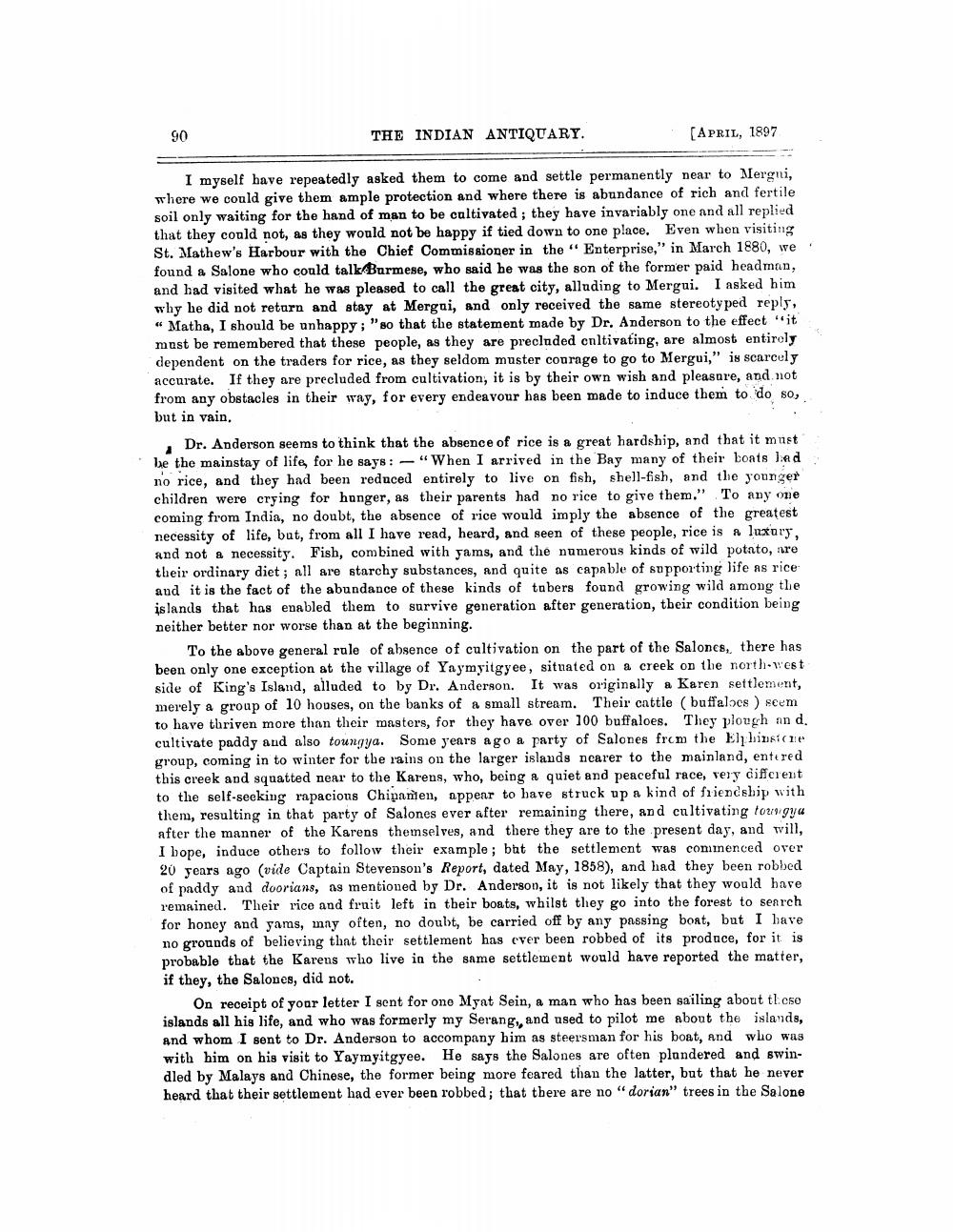________________
90
THE INDIAN ANTIQUARY.
[APRIL, 1897
I myself have repeatedly asked them to come and settle permanently near to Mergni, where we could give them ample protection and where there is abundance of rich and fertile soil only waiting for the hand of man to be cultivated; they have invariably one and all replied that they could not, as they would not be happy if tied down to one place. Even when visiting St. Mathew's Harbour with the Chief Commissioner in the "Enterprise," in March 1880, we found a Salone who could talk Burmese, who said he was the son of the former paid headman, and had visited what he was pleased to call the great city, alluding to Mergui. I asked him why he did not return and stay at Mergai, and only received the same stereotyped reply, " Matha, I should be unhappy; ”so that the statement made by Dr. Anderson to the effect "it must be remembered that these people, as they are precluded cnltivating, are almost entirely dependent on the traders for rice, as they seldom muster courage to go to Mergui," is scarcely accurate. If they are precluded from cultivation, it is by their own wish and pleasure, and not from any obstacles in their way, for every endeavour has been made to induce them to do so, but in vain.
Dr. Anderson seems to think that the absence of rice is a great hardship, and that it must be the mainstay of life, for he says: - “When I arrived in the Bay many of their boats led no rice, and they had been reduced entirely to live on fish, shell-fish, and the younger children were crying for hunger, as their parents had no rice to give them." To any one coming from India, no doubt, the absence of rice would imply the absence of the greatest necessity of life, but, from all I have read, heard, and seen of these people, rice is a luxury, and not & necessity. Fish, combined with yams, and the numerous kinds of wild potato, are their ordinary diet; all are starchy substances, and quite as capable of supporting life as rice and it is the fact of the abundance of these kinds of tubers found growing wild among the islands that has enabled them to survive generation after generation, their condition being neither better nor worse than at the beginning.
To the above general rule of absence of cultivation on the part of the Salones, there has been only one exception at the village of Yaymyitgyee, situated on a creek on the north-West side of King's Island, alluded to by Dr. Anderson. It was originally a Karen settlement, merely a group of 10 houses, on the banks of a small stream. Their cattle (buffalocs ) seem to have thriven more than their masters, for they have over 100 buffaloes. They plough an d. cultivate paddy and also toungya. Some years ago a party of Salones from the El hinsiche group, coming in to winter for the rains on the larger islands nearer to the mainland, entered this creek and squatted near to the Karens, who, being a quiet and peaceful race, very different to the self-seeking rapacious Chipamen, appear to have struck up a kind of friendship with them, resulting in that party of Salones ever after remaining there, and cultivating town gya after the manner of the Karens themselves, and there they are to the present day, and will, I hope, induce others to follow their example; but the settlement was commenced over 20 years ago (vide Captain Stevenson's Report, dated May, 1858), and had they been robbed of paddy and doorians, as mentioned by Dr. Anderson, it is not likely that they would have remained. Their rice and fruit left in their boats, whilst they go into the forest to serrch for honey and yams, may often, no doubt, be carried off by any passing boat, but I have no grounds of believing that their settlement has ever been robbed of its produce, for it is probable that the Karens who live in the same settlement would have reported the matter, if they, the Salones, did not.
On receipt of your letter I sent for one Myat Sein, a man who has been sailing about these islands all his life, and who was formerly my Serang, and used to pilot me about the islands, and whom I sent to Dr. Anderson to accompany him as steersman for his boat, and who was with him on his visit to Yaymyitgyee. He says the Salones are often plandered and swindled by Malays and Chinese, the former being more feared than the latter, but that he never heard that their settlement had ever been robbed; that there are no “dorian" trees in the Salone




